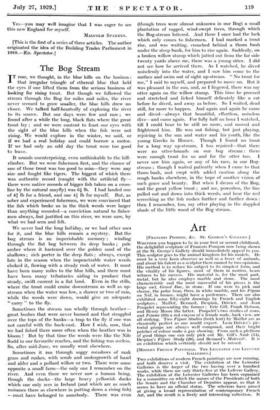The Bog Stream
IT rose, we thought, in the blue hills on the horizon : that irregular triangle of ethereal blue that held the eyes if one lifted them from the serious business of looking for rising trout. But though we followed the stream through the Bog for miles and miles, the river never seemed to grow smaller, the blue hills drew no closer. We talked half-heartedly of exploring the river to its source. But our days were few and rare ; we found after a while the long, black flats where the great trout lay ; and we were content to feast our eyes with the sight of the blue hills when the fish were not rising. We would explore in the winter, we said, or if we had a real holiday and could borrow a motor. If we had only an odd day the trout were too good to leave.
It sounds unenterprising, even unthinkable to the ha. climber. But we were fishermen first, and the chance of one of those trout was too good to miss—they were any size and fought like tigers. The biggest of which there was authentic record (caught with the artificial fly— there were native records of bigger fish taken on a cross- line by the natural mayfly) was 6f lb. I had landed one of 4/ lb for a friend, and one 41 lb for myself. But, as sober and experienced fishermen, we were convinced that the fish which broke us in the thick weeds were larger than anything recorded—a conviction natural to fisher- men always,,but justified on this river, we were sure, by what we had seen and felt.
We never had the long holiday, or we had other uses for it, and the blue hills remain a mystery. But the bog stream is an imperishable memory ; winding through the flat bog between its deep banks ; pale amber where it hastened over the golden sand of the shallows ; rich porter in the deep flats ; always, except late in the season when the impenetrable water weeds choked it, flowing with a steady rush of water. It must have been many miles to the blue hills, and there must have been many tributaries aiding to produce that steady, swift current in a flat land. Even in the stills, where the trout could cruise downstream as well as up- stream when the water was low, a shower or two of rain, while the weeds were down, would give an adequate " carry " to the fly.
Sometimes the stream ran wholly through heather— great bushes that were never burned and that straggled over the tops of the banks—a trap to the fly if one was not careful with the back-cast. How I wish, now, that we had fished there more often when the heather was in bloom ! But by that time the weeds were like the Nile Sudd in our favourite reaches, and the fishing was useless. So, after mid-June, we usually went elsewhere.
Sometimes it ran through soggy meadows of rank grass and rushes, with scrub and undergrowth of hazel and alder and a pollard willow or two. There were some opposite a small farm—the only one I remember on the river. And even there we never saw a human being, though the ducks—the large heavy yellowish ducks which one only sees in Ireland (and which are as much nuisance there as elsewhere in putting down a rising fish) —must have belonged to somebody. There was even (though trees were almost unknown in our Bog) a small plantation of ragged, wind-swept trees, through which the Bog-stream loitered. And there I once had the luck which only comes to fishermen. I had marked a trout rise, and was waiting, crouched behind a thorn bush under the steep bank, for him to rise again. Suddenly, on a broken willow stump which jutted out from the far side twenty yards above me, there was a young otter. I did not see how he arrived there. As I watched, he dived noiselessly into the water, and I saw him come to the surface and swim out of sight up-stream. " No trout for me," I said to myself, and prepared to move on. But it was pleasant in the sun, and, as I lingered, there was my otter again on the willow stump. This time he preened and stretched and licked himself delicately like a cat before he dived, and away as before. So I waited, dead still, for more to happen. And again and again he came and dived—always that beautiful, effortless, noiseless dive—and came again. For fully half an hour I watched, till I could bear to be still no more, and moved and frightened him. He was not fishing, but just playing, rejoicing in the sun and water and his youth, like the young Greeks in Homer. Though I found no trout for a long way up-stream, I too rejoiced—that there were no otter-hounds on our bog stream : there were enough trout for us and for the otter too. I never saw him again, or any of his race, in our Bog- stream ; though I waited patiently when I came to that thorn bush, and crept with added caution along the rough banks elsewhere, in the hope of another vision of such grace and beauty. But when I dream of the Bog, and the great yellow trout ; and see, powerless, the line pulled out and down into thick weeds, and hear the reel screeching as the fish rushes further and further down : then I remember, too, my otter playing in the dappled shade of the little wood of the Bog stream.


































 Previous page
Previous page